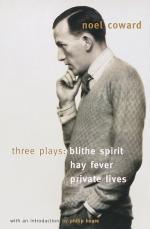|
This section contains 348 words (approx. 1 page at 400 words per page) |

|
Hay Fever Summary & Study Guide Description
Hay Fever Summary & Study Guide includes comprehensive information and analysis to help you understand the book. This study guide contains the following sections:
This detailed literature summary also contains Bibliography on Hay Fever by Noel Coward.
Noel Coward's plays epitomize the sophisticated wit of the era between the two world wars, and Hay Fever, a comedy of manners about a family whose theatrical excesses torment a group of unsuspecting visitors, epitomizes the Coward play. Inspired by a weekend he spent at the house of the actor Laurette Taylor, Coward wrote the play in just three days. Upon its 1925 London debut on August 6, it won praise from both audiences and critics. Considered by many to be cleverly constructed, wittily written, slightly cynical, and undeniably entertaining, the work contains all the elements that would help establish Coward's reputation as a playwright.
Hay Fever is set in the hall of the Bliss family home. The eccentric BlissesJudith, a recently retired stage actress, David, a self-absorbed novelist, and their two equally unconventional children live in a world where reality slides easily into fiction. Upon entering this world, the unfortunate weekend guestsa proper diplomat, a shy flapper, an athletic boxer, and a fashionable sophisticate are repeatedly thrown into melodramatic scenes wherein their hosts profess emotions and react to situations that do not really exist. The resulting comedic chaos ends only when the tortured visitors tip-toe out the door.
Designed to showcase the larger-than-life personalities of celebrated actors (many of whom were close friends of the playwright), Hay Fever, as Coward himself observed in the introduction to the first volume of Play Parade, has "no plot at all and remarkably little action. Its general effectiveness therefore depends on expert technique from each and every member of the cast." The play's humor is provided by context. When the show was revived in 1964, Coward remarked upon how the biggest laughs "occur on such lines as 'Go on, "No there isn't, is there?' and 'This haddock's disgusting.'... the sort of lines... [that] have to be impeccably delivered." Although Coward claimed that he intended only to amuse and cared little about posterity, he might have been pleased that the simple dialogue in Hay Fever would continue to be well-delivered and well-received half a century after it was written.
Read more from the Study Guide
|
This section contains 348 words (approx. 1 page at 400 words per page) |

|



